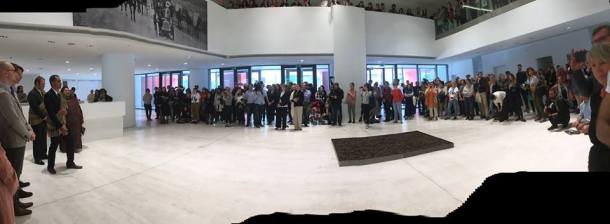
“The whole world is indebted to Greece” stated the famed Argentinian artist Marta Minujin after her performance at the National Museum of Contemporary Art (or EMST), in Athens. Entitled ‘Payment of the Greek Debt to Germany with Olives and Art’, the performance took place at EMST on April 8, (the inauguration day of documenta 14), at 4pm. The crowds packed in to see the artist’s symbolic gesture, which comprised her taking a handful of olives from a large tin tray full of them (that had been placed on the floor), and handing them to Angela Merkel’s double. The large tin tray of olives remains in the museum, as a remnant of the whole art experience, and as a reminder of its message.
The nature of this performance has been garnering some negative praise, seeing as some would prefer to see it in a cynical light, but if one considers the history of this artist’s work, and that she has also realised a similar gesture in light of the Argentinian debt (together with Andy Warhol), then the message is clear: it is done in good will. Something which she also clarified later when I spoke to her, and she explained her love, respect, awe and connection with Greek culture: “I have always had a connection with Greek culture. I have made sculptures inspired by Greek art, and since I was a child I have been reading Plato, Aristotle, Heraclitus and many others. But I really believe that here, in this country in this continent, where 4000 years ago the Greeks invented democracy, created the Parthenon and so many other fantastic things, and all of the Occidental culture too, that it is impossible to have a debt that you have to pay with money. It’s impossible, because the whole world is indebted to Greece. Because their culture comes from here.

Minujin went on to explain even the importance of the Greek gastronomical culture (hence the choice of olives in her performance), the importance of bread and olive oil, before she concluded: “Everything comes from Greece. The debt is already paid. So by doing this performance, maybe people will understand this.” The 74 year old artist with the funky mirror sunglasses and the bleached-blonde hair exuded an air of optimism, as she explained that she had even written to Angela Merkel about the Greek debt and her performance, but never got an answer. “So I found a person who looks the same as Merkel. In the future, it will not matter whether it’s actually Angela Merkel or not”, she explained, in regards to the performance.
What will Merkel think of the performance? “She will pretend she doesn’t know. She will ignore it.” Replies Minujin. But the performance was clearly a message intended for the Chancellor of Germany. But it is also a positive message for Greece, if there are any doubts about this country’s real worth.
Minujin is also realizing another project that reflects on Greek culture, in Kassel, entitled ‘The Parthenon of Books’. She showed me photos on her phone of how the large metal construction (close to the dimensions of the ancient Parthenon), is ready, and now awaits to be covered with the books that have been collected from various sources (from all over the world, including people’s donations, but also from the Frankfurt book fair). They are not just ordinary books however, because they are all books that at certain points in time have been forbidden. Hence the work’s message of freedom and democracy. ‘The Parthenon of Books’ is a work that Minujin has already realized before, in 1983, Buenos Aires.
Pierre Bal-Blanc explains in the documenta 14 catalogue: “Marta Minujin, born in Buenos Aires in 1943, seized this aesthetic and political archetype of democracy for her own situation: corrupted by a ‘national Catholic’ dictatorship that reigned in Argentina up until 1983, she put the democratic ideal back into circulation at the moment when the military junta fell.” Twenty-five thousand books were used then, and will also be needed now, for the new version of this work which will be one of the centre-pieces of Kassel’s documenta 14 exhibition (which runs June 10-September 17, thus ending just before the upcoming Federal German elections).

A bit about Minujin:
Marta Minujin was born in San Telmo, Buenos Aires (in 1943). She married the economist Juan Carlos Gomez Sabaini in 1959 in secret (and had two children with him). She was a student at the National University Art Institute. Having obtained a scholarship, she moved on to Paris, where she also exhibited her work in the ‘Thirty Argentines of the New Generation’ show (1960). She also created ‘livable sculptures’ in Paris and connected with artists such as Christo. Minujin did not lose her connections with the cultural scene in Buenos Aires though, organizing happenings there too, and also earning awards there. In 1966 she moved to New York, after being awarded a Guggenheim Fellowship, and then, another side to her artistic practice started to unfold, comprising of ‘psychedelic art’, and also connecting with Andy Warhol.
In 1976, Minujin returned to Argentina and started to create works inspired by classical Greek sculpture. In 1983 she created her ‘Parthenon of Books’, when democracy returned to Argentina (after the dictatorship). The Latin American debt however, was a burning issue which led her to create a happening in 1985 (entitled ‘The Debt’), together with Andy Warhol, in which she pays the debt off with the gesture of handing over a handful of maize to Andy Warhol (documented via a series of photos).
Minujin’s work has been exhibited all over the world. She is undoubtedly one of Argentina’s most famous contemporary artists, and certainly one of its most colourful, larger-than-life characters.
- The ‘documenta diaries’ is a series to be continued…